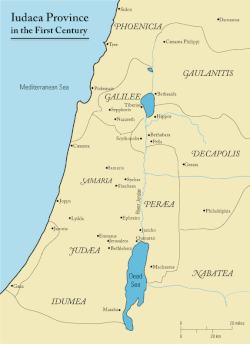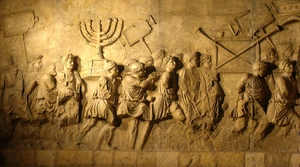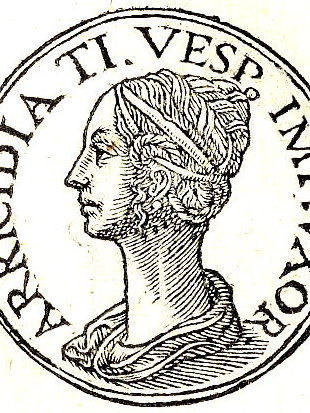Arbre généalogique Snelder - Versteegh » Emperor Titus Flavius Vespasianus (39-81)
Données personnelles Emperor Titus Flavius Vespasianus
- Il est né en l'an 39.
- Il est décédé en l'an 81, il avait 42 ans.
- Un enfant de Vespasianus et Flavia Domitilia
Famille de Emperor Titus Flavius Vespasianus
Il a/avait une relation avec Arricidia Tertulle.
Enfant(s):
Notes par Emperor Titus Flavius Vespasianus
https://en.wikipedia.org/wiki/Titus
family: sans-serif; font-size: 14px; background-color: #ffffff;">Titus Caesar Vespasianus (/ˈtaɪtəs/ TY-təs; 30 December 39 – 13 September 81 AD) was Roman emperor from 79 to 81. A member of the Flavian dynasty, Titus succeeded his father Vespasian upon his death.y commander, serving under his father in Judea during the First Jewish–Roman War. The campaign came to a brief halt with the death of emperor Nero in 68, launching Vespasian's bid for the imperial power during the Year of the Four Emperors. When Vespasian was declared Emperor on 1 July 69, Titus was left in charge of ending the Jewish rebellion. In 70, he besieged and captured Jerusalem, and destroyed the city and the Second Temple. For this achievement Titus was awarded a triumph; the Arch of Titus commemorates his victory to this day.ckground-color: #ffffff;">During his father's rule, Titus gained notoriety in Rome serving as prefect of the Praetorian Guard, and for carrying on a controversial relationship with the Jewish queen Berenice. Despite concerns over his character, Titus ruled to great acclaim following the death of Vespasian in 79, and was considered a good emperor by Suetonius and other contemporary historians.: #ffffff;">As emperor, Titus is best known for completing the Colosseum and for his generosity in relieving the suffering caused by two disasters, the eruption of Mount Vesuvius in AD 79 and a fire in Rome in 80. After barely two years in office, Titus died of a fever on 13 September 81. He was deified by the Roman Senate and succeeded by his younger brother Domitian.; background: none;" title="Rome" href="https://en.wikipedia.org/wiki/Rome">Rome, probably on 30 December 39 AD, as the eldest son of Titus Flavius Vespasianus, commonly known as Vespasian, and Domitilla the Elder.[2] He had one younger sister, Domitilla the Younger (born 45), and one younger brother, Titus Flavius Domitianus (born 51), commonly referred to as Domitian.; line-height: 1.6; font-family: sans-serif; background-color: #ffffff;">Family background[edit]or: #202122; font-family: sans-serif; font-size: 14px; background-color: #ffffff;">Decades of civil war during the 1st century BC had contributed greatly to the demise of the old aristocracy of Rome, which was gradually replaced in prominence by a new provincial Italian nobility during the early 1st century.[3] One such family was the gens Flavia, which rose from relative obscurity to prominence in only four generations, acquiring wealth and status under the Emperors of the Julio-Claudian dynasty. Titus's great-grandfather, Titus Flavius Petro, had served as a centurion under Pompey during Caesar's Civil War. His military career ended in disgrace when he fled the battlefield at the Battle of Pharsalus in 48 BC.[4]ess, Petro managed to improve his status by marrying the extremely-wealthy Tertulla, whose fortune guaranteed the upwards mobility of Petro's son Titus Flavius Sabinus I, Titus's grandfather.[5] Sabinus himself amassed further wealth and possible equestrian status through his services as tax collector in Asia and banker in Helvetia. By marrying Vespasia Polla, he allied himself to the more prestigious patrician gens Vespasia, ensuring the elevation of his sons Titus Flavius Sabinus II and Vespasian to the senatorial rank.[5]color: #202122; font-family: sans-serif; font-size: 14px; background-color: #ffffff;">The political career of Vespasian included the offices of quaestor, aedile and praetor and culminated with a ;consulship in 51, the year Domitian was born. As a military commander, he gained early renown by participating in the Roman invasion of Britain in 43.[6] What little is known of Titus's early life has been handed down by Suetonius, who recorded that he was brought up at the imperial court in the company of Britannicus,[7] the son of Emperor Claudius, who would be murdered by Nero in 55. background-color: #ffffff;">The story was even told that Titus was reclining next to Britannicus on the night he was murdered and sipped of the poison that was handed to him.[7] Further details on his education are scarce, but it seems he showed early promise in the military arts and was a skilled poet and orator both in Greek and Latin.[8]1em 0px 0.25em; padding: 0px; overflow: hidden; border-bottom: 1px solid #a2a9b1; font-weight: normal; font-family: 'Linux Libertine', Georgia, Times, serif; line-height: 1.3; background-color: #ffffff;">Adult life[edit]1.3em 0px; color: #202122; font-family: sans-serif; font-size: 14px;">background-color: #f8f9fa; font-size: 13.16px; width: 172px;">;">military tribune in Germania. He also served in Britannia and perhaps arrived about 60 with reinforcements needed after the revolt of Boudica. About 63, he returned to Rome and married Arrecina Tertulla, daughter of Marcus Arrecinus Clemens, a former Prefect of the Praetorian Guard. She died about 65.[9]amily: sans-serif; font-size: 14px; background-color: #ffffff;">Titus then took a new wife of a much more distinguished family, Marcia Furnilla. However, Marcia's family was closely linked to the opposition to Nero. Her uncle Barea Soranus and his daughter Servilia were among those who perished after the failed Pisonian conspiracy of 65.[10] Some modern historians theorise that Titus divorced his wife because of her family's connection to the conspiracy.[11][12]s never remarried and appears to have had multiple daughters,[13] at least one of them by Marcia Furnilla.[14] The only one known to have survived to adulthood was Julia Flavia, perhaps Titus's child by Arrecina, whose mother was also named Julia.[15] During this period Titus also practiced law and attained the rank of quaestor.[14]le="margin: 0.3em 0px 0px; padding-top: 0.5em; padding-bottom: 0px; overflow: hidden; font-size: 1.2em; line-height: 1.6; font-family: sans-serif; background-color: #ffffff;">Judaean campaigns[edit]2; font-family: sans-serif; font-size: 14px; background-color: #ffffff;" role="note">Further information: First Jewish-Roman War
 le="Iudaea Province" href="https://en.wikipedia.org/wiki/Iudaea_Province">province of Judaea during the 1st century.
le="Iudaea Province" href="https://en.wikipedia.org/wiki/Iudaea_Province">province of Judaea during the 1st century. x;">
x;"> 
 padding: 3px; border: 0px; font-size: 12.3704px;">;Francesco Hayez, oil on canvas (1867) depicts the destruction and looting of the Second Temple by the Roman Army.ffff;">Meanwhile, the Jews had become embroiled in a civil war of their own by splitting the resistance in Jerusalem among several factions. The Sicarii, led by Menahem ben Judah, could hold on for long; the Zealots, led by Eleazar ben Simon, eventually fell under the command of the Galilean leader John of Gush Halav; and the other northern rebel commander, Simon Bar Giora, managed to gain leadership over the Idumeans.[31] Titus besieged Jerusalem. The Roman Army was joined by the Twelfth Legion, which had been previously defeated under Cestius Gallus, and from Alexandria, Vespasian sent Tiberius Julius Alexander, governor of Egypt, to act as Titus' second in command.[32]e legions (Vth, XIIth and XVth) on the western side and one (Xth) on the Mount of Olives to the east. He put pressure on the food and water supplies of the inhabitants by allowing pilgrims to enter the city to celebrate Passover and then refusing them egress. Jewish raids continuously harassed the Roman Army, one of which nearly resulted in Titus being captured.[33]ont-family: sans-serif; font-size: 14px; background-color: #ffffff;">After attempts by Josephus to negotiate a surrender had failed, the Romans resumed hostilities and quickly breached the first and second walls of the city.[34] To intimidate the resistance, Titus ordered deserters from the Jewish side to be crucified around the city wall.[35] By that time the Jews had been exhausted by famine, and when the weak third wall was breached, bitter street fighting ensued.[36]style="text-decoration-line: none; color: #0645ad; background: none;" title="Antonia Fortress" href="https://en.wikipedia.org/wiki/Antonia_Fortress">Antonia Fortress and began a frontal assault on the gates of the Second Temple.[37] As they breached the gate, the Romans set the upper and lower city aflame, culminating with the destruction of the Temple. When the fires subsided, Titus gave the order to destroy the remainder of the city, allegedly intending that no one would remember the name Jerusalem.[38] The Temple was demolished, Titus's soldiers proclaimed him imperator in honour of the victory.[39]mily: sans-serif; font-size: 14px; background-color: #ffffff;">Jerusalem was sacked and much of the population killed or dispersed. Josephus claims that 1,100,000 people were killed during the siege, most of whom were Jewish.[40] Josephus's death toll assumptions are rejected as impossible by modern scholarship since about a million people then lived in the Land of Israel, half of them Jewish, and sizable Jewish populations remained in the area after the war was over, even in the hard-hit region of Judea.[41] However, 97,000 were captured and enslaved, including Simon Bar-Giora and John of ;Gischala.[40] Many fled to areas around the Mediterranean Sea. Titus reportedly refused to accept a wreath of victory, as he claimed that he had not won the victory on his own but had been the vehicle through which their God had manifested his wrath against his people.[42]ound-color: #ffffff;">The Jewish diaspora during the Temple's destruction, according to Josephus, was in Parthia (Persia), Babylonia (Iraq), and Arabia, and some were beyond the Euphrates and in Adiabene (Kurdistan).[43]padding-top: 0.5em; padding-bottom: 0px; overflow: hidden; font-size: 1.2em; line-height: 1.6; font-family: sans-serif; background-color: #ffffff;">
padding: 3px; border: 0px; font-size: 12.3704px;">;Francesco Hayez, oil on canvas (1867) depicts the destruction and looting of the Second Temple by the Roman Army.ffff;">Meanwhile, the Jews had become embroiled in a civil war of their own by splitting the resistance in Jerusalem among several factions. The Sicarii, led by Menahem ben Judah, could hold on for long; the Zealots, led by Eleazar ben Simon, eventually fell under the command of the Galilean leader John of Gush Halav; and the other northern rebel commander, Simon Bar Giora, managed to gain leadership over the Idumeans.[31] Titus besieged Jerusalem. The Roman Army was joined by the Twelfth Legion, which had been previously defeated under Cestius Gallus, and from Alexandria, Vespasian sent Tiberius Julius Alexander, governor of Egypt, to act as Titus' second in command.[32]e legions (Vth, XIIth and XVth) on the western side and one (Xth) on the Mount of Olives to the east. He put pressure on the food and water supplies of the inhabitants by allowing pilgrims to enter the city to celebrate Passover and then refusing them egress. Jewish raids continuously harassed the Roman Army, one of which nearly resulted in Titus being captured.[33]ont-family: sans-serif; font-size: 14px; background-color: #ffffff;">After attempts by Josephus to negotiate a surrender had failed, the Romans resumed hostilities and quickly breached the first and second walls of the city.[34] To intimidate the resistance, Titus ordered deserters from the Jewish side to be crucified around the city wall.[35] By that time the Jews had been exhausted by famine, and when the weak third wall was breached, bitter street fighting ensued.[36]style="text-decoration-line: none; color: #0645ad; background: none;" title="Antonia Fortress" href="https://en.wikipedia.org/wiki/Antonia_Fortress">Antonia Fortress and began a frontal assault on the gates of the Second Temple.[37] As they breached the gate, the Romans set the upper and lower city aflame, culminating with the destruction of the Temple. When the fires subsided, Titus gave the order to destroy the remainder of the city, allegedly intending that no one would remember the name Jerusalem.[38] The Temple was demolished, Titus's soldiers proclaimed him imperator in honour of the victory.[39]mily: sans-serif; font-size: 14px; background-color: #ffffff;">Jerusalem was sacked and much of the population killed or dispersed. Josephus claims that 1,100,000 people were killed during the siege, most of whom were Jewish.[40] Josephus's death toll assumptions are rejected as impossible by modern scholarship since about a million people then lived in the Land of Israel, half of them Jewish, and sizable Jewish populations remained in the area after the war was over, even in the hard-hit region of Judea.[41] However, 97,000 were captured and enslaved, including Simon Bar-Giora and John of ;Gischala.[40] Many fled to areas around the Mediterranean Sea. Titus reportedly refused to accept a wreath of victory, as he claimed that he had not won the victory on his own but had been the vehicle through which their God had manifested his wrath against his people.[42]ound-color: #ffffff;">The Jewish diaspora during the Temple's destruction, according to Josephus, was in Parthia (Persia), Babylonia (Iraq), and Arabia, and some were beyond the Euphrates and in Adiabene (Kurdistan).[43]padding-top: 0.5em; padding-bottom: 0px; overflow: hidden; font-size: 1.2em; line-height: 1.6; font-family: sans-serif; background-color: #ffffff;"> 1.4em; padding: 3px; border: 0px; font-size: 12.3704px;">one; color: #0645ad; background: none;" title="Roman triumph" href="https://en.wikipedia.org/wiki/Roman_triumph">triumph after the First Jewish-Roman War was celebrated with the Arch of Titus in Rome, which shows the treasures taken from the Temple, including the Menorah and the trumpets of Jericho.o sail to Italy during the winter, Titus celebrated elaborate games at Avez-vous des renseignements supplémentaires, des corrections ou des questions concernant Emperor Titus Flavius Vespasianus?
1.4em; padding: 3px; border: 0px; font-size: 12.3704px;">one; color: #0645ad; background: none;" title="Roman triumph" href="https://en.wikipedia.org/wiki/Roman_triumph">triumph after the First Jewish-Roman War was celebrated with the Arch of Titus in Rome, which shows the treasures taken from the Temple, including the Menorah and the trumpets of Jericho.o sail to Italy during the winter, Titus celebrated elaborate games at Avez-vous des renseignements supplémentaires, des corrections ou des questions concernant Emperor Titus Flavius Vespasianus?


